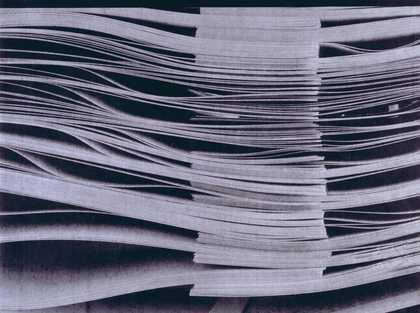The Journal
Tate Papers is a peer-reviewed online journal and research platform focusing on art, its history and museum practice. Published twice a year, the journal reflects the breadth of Tate’s collection, exhibition programme and activities, but submissions to Tate Papers do not need to refer to Tate or to works in its collection.
Tate Papers aims to showcase a range of disciplinary approaches to the study of art and museums, and welcomes new and experimental ways of participating in research. Peer-reviewed formats include text-based articles, practice-based research, video essays and interactive digital experiences.
Occasionally the journal publishes interviews, conversations, museum reports as well as documentation of lectures, performances or artworks. These are not peer reviewed but included in the journal as they offer insights into the work of museums today.
Articles published in Tate Papers are deemed by UK research councils to be suitable for submission to the Research Excellence Framework.
Masthead
Editor: Martha Barratt, Research Convenor (Ben Roberts, Interim Research Convenor)
Managing Editor: Lisa Stein
Research Assistant: Rebecka Ohrstrom Kann
Research Integrity Lead: David Dibosa, Director of Research and Interpretation
Research Grants Manager: Kim Balukiewicz
Strategic Research Projects Manager: Jess Sully
Open Access and Copyright
Founded in 2004, Tate Papers is a pioneer of open-access scholarly publishing. The journal is listed in the Directory of Open Access Journals and complies with UK Research and Innovation’s open access policy.
Tate Papers articles are published under a CC BY-NC licence. External authors retain copyright of their work. Copyright of articles written by Tate staff in work time is vested in Tate. In both cases authors are free to republish the material elsewhere providing acknowledgement that the article was first published in Tate Papers is made.
Tate is a member of the Shared Research Repository for cultural and heritage organisations hosted by the British Library, London. The repository aims to increase the visibility and impact of research, making the knowledge generated by cultural institutions easier to find and explore. You can access Tate’s research at tate.iro.bl.uk.
Editorial Decisions
The editors of Tate Papers are responsible for deciding which submissions will be published in the journal. This decision is based solely on the originality, quality and rigour of the submission and on its relevance to the remit of Tate Papers.
After conducting an internal review, the editors will decide whether to send a submission out for peer review. Following peer review the editors will make a final decision. Submissions may be rejected, accepted, or accepted provided recommended revisions are made.
Any submitted material remains confidential while under internal and external review.
Peer Review Process
All articles are subjected to an anonymous peer review process, in which the identity of the author is hidden from reviewers and the reviewers’ identities are hidden from the author.
Submissions are typically sent to two reviewers. The editors will not consider author-suggested reviewers.
Research Integrity and Publication Ethics
Tate Papers follows Tate’s Code of Good Research Practice. All research published in the journal must have been conducted in a fair and ethical manner, in accordance with international and local guidelines.
Tate’s named Research Integrity Lead is David Dibosa, Director of Research and Interpretation. Appeals, complaints and questions about research conduct should be sent to us by email.
Conflicts of interest
A conflict of interest is a situation in which an individual or institution might derive personal benefit from actions or decisions made in their official capacity. Tate Papers follows Tate’s Code of Good Research Practice as guidance for any undisclosed conflict of interest that emerges during peer review, production or after publication.
Editors
Editors shall disclose any conflicts of interest resulting from competitive or other disqualifying relationships with an author and will not participate in decision-making processes.
Authors
All authors should disclose any potential conflict of interest for themselves as well as any co-authors at the point of submission. Sources of financial support for projects should also be disclosed.
Peer reviewers
Individuals that have a conflict of interest relating to a submission should recuse themselves and will not be assigned to review the submission. If during peer review an editor, reviewer or author becomes aware of a conflict of interest that was not previously known or disclosed they should inform the editors immediately.
Charges and Contributor Agreement
Tate Papers has no article processing charges and no submission charges.
Tate images are reproduced freely in the journal; other images are sourced without charge to authors. Note that all wholly Tate-owned, fully copyright-expired collection works are available under a CC BY-NC-ND licence.
After an article has been accepted for publication, the author will be sent a Contributor Agreement. Authors are encouraged to read each section on the agreement carefully and return it within a reasonable timeframe.
After Publication
Changes to published work
The journal will make changes to published work if the publication record is seriously affected by the academic accuracy of the published information. If an author finds an error or inaccuracy in their published work, it is their obligation to notify the editors.
Author name or pronoun changes
Authors should contact the editors to update their names or pronouns. The editors will update the editable, digital versions of the relevant submissions and update the metadata associated with the submission on the Research Repository.
Contact
Information about the submission process and style guidelines can be found in How to Submit. If you have any questions, please contact us by email.
Parts of this statement were adapted from the ‘Instructions to Authors’ of the journal Art History and from the ‘Publication Statement’ of the Oxford Artistic and Practice Based Research Platform.
Image: John Latham, Flat Time 1–10 2004 (detail), Tate P79066.

